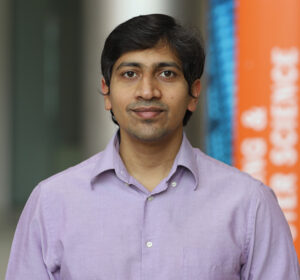Whether extracting information from big data, discovering knowledge in complex networks, or infusing intelligence in robots, ECS researchers are actively working to push the boundary of artificial intelligence (AI) research. From exploring foundational theory for machine learning (ML) to developing intelligence in next-generation cyber-physical systems, their scholarly activities are making a profound impact on the science and engineering of ML and AI.

A core research area is data mining where ECS researchers seek to understand, interpret, and predict events from massive datasets. The fusion of information from diverse sources involving both physical and cyber systems is another area where fundamental research challenges and innovative technological solutions are being pursued. Across ECS, researchers are also working collaboratively to harvest the power of ML/AI to enable intelligent building control for a smart, healthy, and decarbonized built environment.

The work of Dr. Zafarani that combines graph theory with ML has introduced new ways to represent and visualize massive-scale social networks and has led to applications in the early detection of “fake news”, and in identifying malicious users across multiple social media sites. Another example is the trustworthy ML developed by Ferdinando Fioretto to analyze and quantify the disparate impacts of differential privacy in critical decision-making problems and learning tasks, including funding allocations and distribution of benefits that affect hundreds of millions of people in the US alone.
Some notable ECS news stories in this area include:
- Professor Reza Zafarani’s NSF CAREER Award
- Professor Ferdinando Fioretto’s NSF CAREER Award
- Professors Ferdinando Fioretto and Endadul Hoque’s Google Research Scholar Awards
- Professors Ferdinando Fioretto Receives Award for Outstanding Research in Privacy Enhancing Technologies
- Professor Sucheta Soundarajan’s NSF CAREER Award
- Electrical Engineering, Computer Science Researchers Win Artificial Intelligence Award
- Professor Qinru Qiu Named a Distinguished Member of the Association for Computing Machinery
- Professor Pramod K. Varshney won 2021 Shannon-Nyquist Technical Achievement Award from the IEEE Signal Processing Society
Please explore the departmental webpages or the researchers’ websites below for more information.














